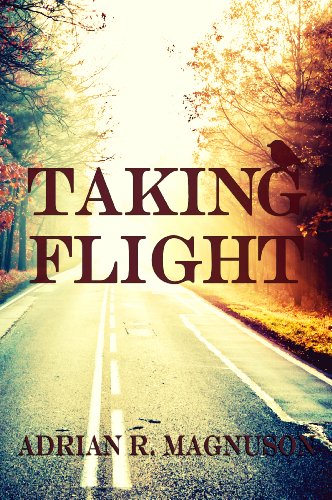 Book: Taking Flight
Book: Taking Flight
Author: Adrian R. Magnuson
Publisher: Pink Fish Press
“Taking Flight” takes off with a strong premise: A 13-year-old boy named Jeremy goes off on a fugitive road trip with an elderly man named Harry who is on his own run for freedom as his memory is slipping away.
The story and writing opens equally strong as the narrative jumps between the novel’s five main characters: Jeremy (who later goes by Jay), Harry (a brash, old man with Alzheimer’s, who by the way lost one of his legs in a car crash), Abby (Harry’s wife who is trying to find her runaway husband), Rose (Jeremy’s extremely brash, unstable and selfish mother) and Jackson (Jeremy’s father, separated from Rose but desperately wants her back).
Jeremy and Harry meet on the plane where Jeremy is flying to New York to spend some time with his mother, Rose, while his father, Jackson, is on a medical trip to Africa. But when Jeremy lands and meets his mother, the two of them get into a fight, and Rose leaves so angry that she abandons her adolescent son in the middle of the airport crowd to go have herself a Bloody Mary to cool off her temper. When she returns, Jeremy is gone. He’s hitched up with Harry and they’ve decided to go on an adventure together. They both love watching birds and they’re both trying to escape: Jeremy from his cruel and cold mother and Harry from the imprisonment of being kept at home because his lapse in memory is making him a danger to himself and others.
So thus is the thrust of the book… Which is more worthy of defending: A personal freedom or a public safety? Harry, who struggles with Alzheimer’s, is a (minor) threat to society because he can forget where he is or who everyone else is at any moment, but to ensure public safety would mean that Harry needs to stay at home, away from society, and be stripped of his personal freedom. That’s why he’s gone on the run.
Along their journey, Harry’s loss of memory begins to cause problems, once even leaving Jeremy stranded with a pedophile.
This all sounds great and exciting, but the story often bogs down into unnecessary details and trivial character exchanges that make the journey feel more like a visit to the retirement home and less of an adventure for freedom.
Other readers have complained about the fact that the story gives too many details about birds and bird watching. That didn’t bother me nearly as much as the pages and pages of dialogue that went on without building any conflict or propel the story forward. Often the dialogue made me feel like the novel was either stuck in the moment or stuck in the past.
The main problem I had with the dialogue was that it was used too often to reveal back story. Instead of giving the back story through flashback scenes, we learn about most characters’ backgrounds in dialogue between other characters. This technique often came across trite instead of being vital to the story.
Additionally, the narrative structure can be cumbersome at first. While Abby, Harry and Jeremy all get to tell their portion of the story in the first person, Rose and Jackson are narrated in the third person. Ironically, it was actually the story and tension surrounding Rose and Jackson that interested me the most. The prose is at its best when the narrator is in third person, which works against the novel’s two main characters: Jeremy and Harry.
I have to admit that I put down this book (and had no desire of returning to it) at least three different times. It wasn’t because I hated the book, but because there was no real suspense to make me want to keep going. There’s no sense of urgency, nothing at stake, until the final third of the book. So for the first 200 pages or so, nobody is really in any danger, so why care?
There are, however, several redeemable qualities. For one, the writing is polished, and when the narrative is in the third person, the prose is darn good. The tension between Rose and Jackson is palpable and it’s enough to make you want to discover how their broken marriage might turn out. Additionally, there is a lot of tenderness that shines through. Overall the book makes you care about the theme at hand: the struggle between defending one’s freedom and defending one’s safety.
Though this story has a lot of depth and tenderness, in the end “Taking Flight” fails to take off with an emotional impact.
The book is better than three stars but doesn’t shine enough to earn four. So three-and-a-half stars it is, then.
 Michel Sauret – Award-Winning Army Journalist | Independent Author Award-Winning Army Journalist, Independent Author
Michel Sauret – Award-Winning Army Journalist | Independent Author Award-Winning Army Journalist, Independent Author





